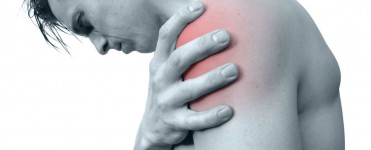 Shoulder Pain is common and can be caused by a number of conditions. These conditions include:
Shoulder Pain is common and can be caused by a number of conditions. These conditions include:
Rotator cuff problem – pain in the shoulder or upper arm, particularly when lifting the arm, lying on it or using the sore muscles. It is often the result of repetitive overuse of the arm and shoulder during a sport or activity or the result of a shoulder injury. Age can also play a part.
Acromioclavicular joint pain – painful joint on the tip of the shoulder where the collarbone and shoulder blade join
Frozen shoulder or adhesive capsulitis – is the painful and gradual stiffening of the shoulder capsule (the tissue that surrounds your shoulder joint) and the shoulder can often become so stiff and painful that it limits your ability to use your arm in everyday activities.
Referred shoulder pain – pain is experienced in an area away from the actual injury or problem e.g. pain in shoulder which is usually referred from the neck or upper back
Osteoarthritis – progressive wearing away of the cartilage of the joint leading to the two bones of the joint rubbing together causing pain. Patients who have had previous trauma or shoulder surgery are most likely to develop osteoarthritis in later life. Symptoms include swelling, stiffness, aching and sharp, stabbing pains.
Shoulder instability – dislocation or excessive movement of the shoulder joint.
How can osteopaths help?
- Shoulder problems are often complex and can take a long time to resolve. An osteopath will work with you to try and understand the cause of your shoulder problem.
- Depending on your age, fitness and the diagnosis we may use a variety of massage, rhythmical articulation and stretching techniques to try and improve the movement in your shoulder and reduce tension in any tight muscles.
- Treatment is different in every individual and we may massage and loosen the joints of the neck and upper and mid back and shoulder blade area and sometimes the low back and hips if we feel they are contributing to your shoulder pain.
- We may offer specific strengthening or loosening exercises to the shoulder and offer advice on posture and look at how you use your shoulder and any lifestyle habits that may be contributing to your shoulder problem.
- X-rays, scans or other tests may be required to make a diagnosis and we may refer you to your GP for any further treatment.
Useful links
Osteopathic Sports care association
Arthritis Research UK
Are You Suffering From Pain In The Shoulder?
CONTACT US NOW